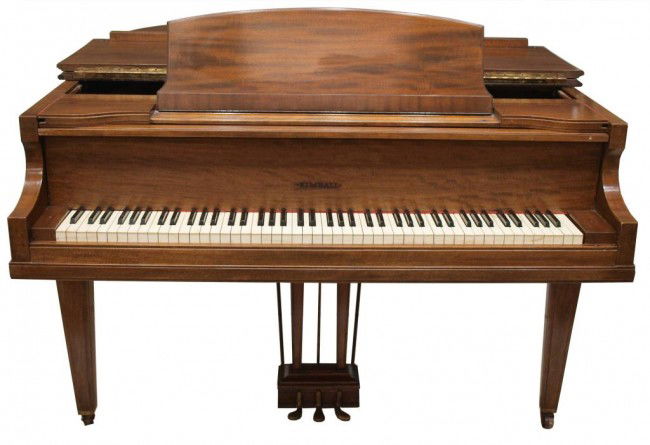

Celestin worked with several pianists after that, including Manuel Manetta, but was seeking a permanent person for the band.
#1946 kimball baby grand piano plus#
Celestin had parted ways with his longtime co-leader of the Original Tuxedo Orchestra, trombonist William “Bebe” Ridgely, who had managed to retain the name of the band, plus many of the musicians, including the pianist, Emma Barrett. Though some accounts say 1925, and others 1926, it was probably the summer or fall of 1925 when Papa “Oscar” Celestin stopped long enough on one of his trips through Pass Christian to audition a new pianist for the band he was in the process of reorganizing. This band played at a hotel, the Inn by the Sea. Jeanette gained ensemble experience as a child, when she played in a string band consisting of Harry Watson, mandolin and leader Eddie Watson, guitar Henry Watson, banjo Murray bass, and herself on piano. She also remembered another talented piano student, Ruby May Townsend, who became a public school music teacher later on. She recalled that while boys as well as girls took piano lessons in her home town, there were more girls. Kimball told William Russell that she “lived at the piano” when she began taking lessons from Anna Stewart, that she took three lessons a week, for which Stewart charged a weekly total of fifty cents. In fact, Stewart’s method, which Kimball would continue to uphold, began with a strong foundation in music theory. In either case, it seems that Stewart was a conservatory trained musician, who did not only teach her gifted bass, and harmony. And I just loved music always and had a natural talent from God, which my deceased mother recognized-God bless her soul." In another interview, she said that Stewart was a graduate of the New England Conservatory, rather than the Boston Conservatory. “Her name was Anna Stewart, a graduate of Boston Conservatory. "I had a good teacher,” she wrote to historian D. Kimball regularly credited her piano teacher with giving her the training that would solidify her reputation as a player who could sight-read anything and transpose on the spot. She enjoyed all kinds of styles besides jazz, including classical, semi-classical, and opera. Throughout her life, she would continue to study music, and to play at home alone. In one interview, she told of a music class she taught to children and adults at the age of eleven.

She began taking lessons at age seven, and was teaching music by the time she was fourteen. Her mother decided to get her a music teacher when Jeanette proved her talents by playing the piano when they visited other people’s houses. Her sister Octavia, who was three years older, took piano lessons, but only Jeanette became a serious musician. In addition to hearing jazz bands on the backs of trucks, she gained exposure to music from the Catholic church, social, and school events, from the records that her family had at home, and from piano lessons. Jeanette’s own musical life began quite early, despite the fact that she was the only person in her family whose interest in music was more than casual. It is doubtful that she heard the role of the piano in these bands, or saw the pianists (who were frequently women) since pianos were not generally carted along on these mobile previews-of-coming attractions.1 But she did gain a familiarity with the music of New Orleans jazz bands from hearing their piano-less ensembles, quite literally as they traveled through town.

To ballyhoo is to advertise a band’s wares by playing from the backs of trucks. Jeanette’s strict upbringing prevented her from attending public dances where these traveling groups played–even in her late teens–but she was able to hear these bands, including Sam Morgan’s, Kid Rena’s, Tom Albert’s, and, later, Papa Celestin’s when they would ballyhoo their way through town. Located less than 70 miles east of New Orleans, Pass Christian was a logical stop along the way for New Orleans bands on Gulf Coast tours, making the small town conducive to an introduction to jazz in the early 1900s. Both Susan and Julius Salvant had been born in Louisiana, but had relocated to Pass Christian, in Harrison County, Mississippi. census variously as “B” for black and “Mu” for mulatto, the Salvants were English speakers, with French Creole of color heritage. Jeanette Salvant was raised by her mother, Susan “Susie” Salvant, a cook for a private family, and her father Julius “June” Salvant, a carpenter, along with her older sister, Octavia, and two younger brothers, Julius and Gaines.


 0 kommentar(er)
0 kommentar(er)
